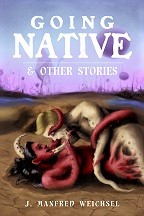by
J. Manfred Weichsel
(DimensionBucket Media, March 2019, pb, 105 pp.)
Reviewed by Victoria Silverwolf
Half a dozen tales of strange encounters and bizarre transformations appear in the pages of this slender collection. The author often mixes genres, as well as blending violence and horror with comedy and satire. All of the stories are reprints from small press publications, and are thus likely to be new to most readers.
“Going Native” features a young man vacationing on a distant world. Aliens who seem human in every way, except for their bright red skin, inhabit the planet. The protagonist has a sexual affair with an alien woman, leading to weird changes in his body. Eventually he discovers the horrifying truth about the aliens’ method of reproduction.
This mixture of science fiction and body horror is likely to raise goosebumps with its vivid descriptions of the narrator’s metamorphosis. The author offers a scientific explanation for why the aliens should so closely resemble humans, but it is hardly convincing.
In “The Funniest Story Ever Told,” benign aliens arrive on Earth, ready to offer technological wonders to humanity. The only problem is that their appearance causes everyone who sees them to laugh uncontrollably. Eager to avoid offending the aliens and losing their gifts, Earth governments perform operations on the entire population of the planet to stop the laughter. Despite this precaution, things don’t quite work out.
Even for a joke with a satiric punchline, this story is implausible. An important part of the plot is the fact that the operation drops the IQ of those who undergo the procedure by five points. Given the well-known limitations of IQ measurement, such a small change would be meaningless, rendering the story pointless.
“Complicit in Their Bondage” begins with two soldiers escaping from the Taliban. They struggle to survive the desert, only to encounter weird dog-men and the people who control them. The masters kill one of the men, assuming he has enslaved the other, a black man, because he is white. It turns out that these people are the descendants of British slave owners, who fled their own land when slavery was outlawed. They have bred their slaves into bizarre forms, including the dog-men. The surviving soldier becomes their prisoner, and finds out the fate they have in store for him.
The mutated slaves are so outlandish in shape that they seem like something out of a cartoon. They fact that they are given silly names like “woggle-boggles” adds to this feeling. The author adds a touch of satire when two very famous figures from modern American politics show up. Even those who agree with the writer’s obvious strong dislike for this pair are likely to find their appearance an inappropriate distraction from the plot.
“The Garden of Prince Shi-Wiwi” takes place in a world, possibly in the future, where Asians keep Africans as caged animals. One of the Asian leaders feeds Africans to giant carnivorous plants. Another Asian, sympathizing with a victim, tries to rescue her from a horrible death. The ironic ending reminds us that no good deed goes unpunished.
This is the simplest story in the collection, with an obvious point to make about human cruelty. If the author is trying to say something about race relations, it escaped me.
By way of contrast, “Alter Ego,” the longest story in the book, also has the most convoluted plot. A man who has two personalities is in a mental hospital. He soon finds out that the director of the hospital is a devil worshipper, using the man’s evil personality to kill women as sacrifices to a demon. With the help of a fellow inmate, he fights to stop the anti-Christ from entering the world.
A number of factors make this basic plot extremely complicated. The man’s two personalities often pretend to be each other. The director possesses magic spells, one of which causes a person to look like someone else, and another which causes one person’s mind to enter another body. With all of this going on, it’s almost impossible for any of the characters to know who is really who. The reader is likely to be equally confused. The combination of gruesome horror and farce is not always effective.
“We Might Not Have Fire, But We Sure As Hell Have Fury” begins with a soldier captured by radical activists, calling themselves Aztecs, who intend to conquer the southwestern part of the United States by causing instability in Latin America, leading to a wave of immigration into the USA. The plot takes a wild turn after the Aztecs throw their captive into a volcano. Instead of dying, the man winds up in the far future. Plants have mutated into deadly forms. Snake-like aliens have conquered the United States. With the help of a so-called princess, he fights to free the weak, cowardly Americans from their bondage.
Besides the opening scene, which is almost entirely irrelevant to the rest of the plot, there are other indications that this story is a warning against immigrants coming to the United States. The aliens did not conquer the nation by force, but by having Americans voluntarily accept them. Along with a conclusion that seems to promote autocratic rule by the strong as superior to democratic rule by the weak, this theme makes the story a controversial one. Readers’ reactions to it are likely to depend on their views on the issue of immigration. Strictly as an adventure story, it’s certainly fast-moving and colorful, if not very logical.
Victoria Silverwolf will not offer any political opinions at this time.
 Going Native & Other Stories
Going Native & Other Stories